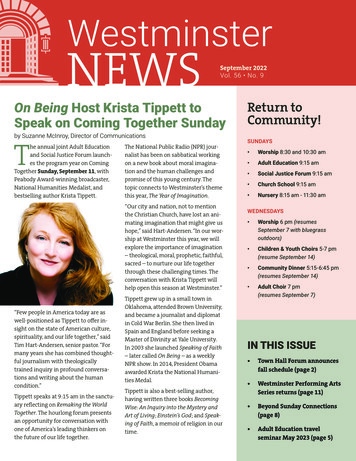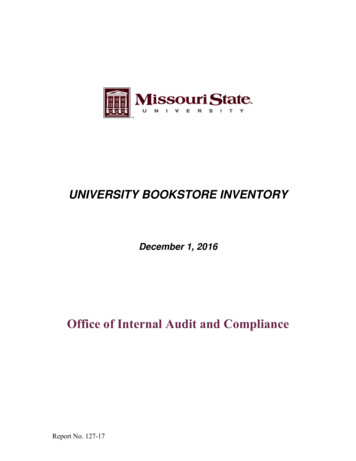
Transcription
ivp classicsivpclassicsBasic ChristianitysJohn StottF o r e wo r dbyR i c k Wa r r e nO v e r 2 . 5 M i l l i o n C o p i e s so l d
BasicChristianity.book Page 2 Friday, October 20, 2006 9:50 AM
Front Matter.fm Page 3 Friday, May 13, 2011 11:04 AMBasicChristianitysJOHN STOTTFOREWORD BY RICK WARREN
Front Matter.fm Page 4 Monday, January 4, 1904 10:21 PMInterVarsity PressP.O. Box 1400, Downers Grove, IL 60515-1426World Wide Web: www.ivpress.comE-mail: email@ivpress.com lnter-Varsity Press, London First Edition, March 1958 Second Edition, May 1971Retypeset and Americanized with a new foreword 2006 by Inter-Varsity Press, LondonPublished in the United States of America by InterVarsity Press, Downers Grove, Illinois, with kindpermission of Wm. B. Eerdmans Publishing Co., Grand Rapids, Michigan.All rights reserved. No part of this book may be reproduced in any form without written permissionfrom Wm. B. Eerdmans Publishing Co., Grand Rapids, Michigan.InterVarsity Press is the book-publishing division of InterVarsity Christian Fellowship/USA , amovement of students and faculty active on campus at hundreds of universities, colleges and schoolsof nursing in the United States of America, and a member movement of the International Fellowshipof Evangelical Students. For information about local and regional activities, write Public RelationsDept., InterVarsity Christian Fellowship/USA, 6400 Schroeder Rd., P.O. Box 7895, Madison, WI53707-7895, or visit the IVCF website at www.intervarsity.org .The Scripture quotations quoted herein are from the Revised Standard Version of the Bible,copyright 1946, 1952, 1971 by the Division of Christian Education of the National Council of theChurches of Christ in the U.S.A. Used by permission. All rights reserved.Design: Cindy KipleImages: Abel Leão/iStockphotoISBN 978-0-8308-6379-2 (digital)ISBN 978-0-8308-3403-7 (print)
BasicChristianity.book Page 5 Friday, October 20, 2006 9:50 AMContentsForeword by Rick Warren . . . . . . . . . . . . . .Preface . . . . . . . . . . . . . . . . . . . . . . . .1 The Right Approach . . . . . . . . . . . . . .7913PART ONE: CHRIST’S PERSON2 The Claims of Christ . . . . . . . . . . . . .273 The Character of Christ . . . . . . . . . . . .444 The Resurrection of Christ . . . . . . . . . .57PART TWO: MAN’S NEED5 The Fact and Nature of Sin . . . . . . . . . .776 The Consequences of Sin . . . . . . . . . . .89PART THREE: CHRIST’S WORK7 The Death of Christ . . . . . . . . . . . . . .1038 The Salvation of Christ . . . . . . . . . . . .123PART FOUR: MAN’S RESPONSE9 Counting the Cost . . . . . . . . . . . . . . .13510 Reaching a Decision . . . . . . . . . . . . . .15211 Being a Christian. . . . . . . . . . . . . . . .164
BasicChristianity.book Page 6 Friday, October 20, 2006 9:50 AM
BasicChristianity.book Page 7 Friday, October 20, 2006 9:50 AMForewordsThere are a few landmarkbooks that everyone in the world should read. This is one of therare few.In the twenty-first century, you cannot afford to ignore thisbook! Whether you are a skeptic, raised in another faith, spiritual seeker or Christian believer, you need to know why 2.3 billion people call themselves “Christians.” You need to know whatthey believe and why they believe it.This book is especially essential for leaders in business, government, academics, media, entertainment, journalism andother fields that work directly with people. To be able to havean intelligent conversation with one-third of our world's population, you need to understand their worldview.John Stott’s Basic Christianity is a classic introduction to thefaith that has transformed billions of lives.Rick WarrenPastor, Saddleback Church
BasicChristianity.book Page 8 Friday, October 20, 2006 9:50 AM
BasicChristianity.book Page 9 Friday, October 20, 2006 9:50 AMPrefacesHostile to the church, friendlyto Jesus Christ.” These words describe large numbers of people,especially young people, today.They are opposed to anything which savors of institutionalism. They detest the establishment and its entrenched privileges. And they reject the church—not without some justification—because they regard it as impossibly corrupted bysuch evils.Yet what they have rejected is the contemporary church, notJesus Christ himself. It is precisely because they see a contradiction between the founder of Christianity and the current state ofthe church he founded that they are so critical and aloof. Theperson and teaching of Jesus have not lost their appeal, however. For one thing, he was himself an antiestablishment figure,and some of his words had revolutionary overtones. His idealsappear to have been incorruptible. He breathed love and peace
BasicChristianity.book Page 10 Friday, October 20, 2006 9:50 AM10BASIC CHRISTIANITYwherever he went. And, for another thing, he invariably practiced what he preached.But was he true?An appreciable number of people throughout the world arestill brought up in Christian homes in which the truth of Christand of Christianity is assumed. But when their critical facultiesdevelop and they begin to think for themselves, they find it easier to discard the religion of their childhood than make the effort to investigate its credentials.Very many others do not grow up in a Christian environment. Instead they absorb the teaching of Hinduism, Buddhismor Islam, or the ethos of secular humanism, communism or existentialism.Yet both groups, if and when they read about Jesus, find thathe holds for them a fascination they cannot easily escape.So our starting point is the historical figure of Jesus of Nazareth. He certainly existed. There is no reasonable doubt aboutthat. His historicity is vouched for by pagan as well as Christianwriters.He was also very much a human being, whatever else may besaid about him. He was born, he grew, he worked and sweated,rested and slept, he ate and drank, suffered and died like othermen. He had a real human body and real human emotions.But can we really believe that he was also in some sense“God”? Is not the deity of Jesus a rather picturesque Christian superstition? Is there any evidence for the amazing Christian assertion that the carpenter of Nazareth was the unique Son of God?This question is fundamental. We cannot dodge it. We mustbe honest. If Jesus was not God in human flesh, Christianity isexploded. We are left with just another religion with some beau-
BasicChristianity.book Page 11 Friday, October 20, 2006 9:50 AMPreface11tiful ideas and noble ethics; its unique distinction has gone.But there is evidence for the deity of Jesus—good, strong,historical, cumulative evidence; evidence to which an honestperson can subscribe without committing intellectual suicide.There are the extravagant claims which Jesus made for himself,so bold and yet so unassuming. Then there is his incomparablecharacter. His strength and gentleness, his uncompromisingrighteousness and tender compassion, his care for children andhis love for outcasts, his self-mastery and self-sacrifice have wonthe admiration of the world. What is more, his cruel death wasnot the end of him. It is claimed that he rose again from death,and the circumstantial evidence for his resurrection is mostcompelling.Supposing Jesus was the Son of God, is basic Christianitymerely an acceptance of this fact? No. Once persuaded of thedeity of his person, we must examine the nature of his work.What did he come to do? The biblical answer is, he “came intothe world to save sinners.” Jesus of Nazareth is the heavensentSavior we sinners need. We need to be forgiven and restoredto fellowship with the all-holy God, from whom our sins haveseparated us. We need to be set free from our selfishness andgiven strength to live up to our ideals. We need to learn to loveone another, friend and foe alike. This is the meaning of “salvation.” This is what Christ came to win for us by his deathand resurrection.Then is basic Christianity the belief that Jesus is the Son ofGod who came to be the Savior of the world? No, it is not eventhat. To assent to his divine person, to acknowledge man’s needof salvation, and to believe in Christ’s saving work are notenough. Christianity is not just a creed; it involves action. Our
BasicChristianity.book Page 12 Friday, October 20, 2006 9:50 AM12BASIC CHRISTIANITYintellectual belief may be beyond criticism; but we have totranslate our beliefs into deeds.What must we do, then? We must commit ourselves, heartand mind, soul and will, home and life, personally and unreservedly to Jesus Christ. We must humble ourselves beforehim. We must trust in him as our Savior and submit to him asour Lord; and then go on to take our place as loyal members ofthe church and responsible citizens in the community.Such is basic Christianity, and the theme of this book. Butbefore we come to the evidence for Jesus Christ’s deity, an introductory chapter on the right approach is necessary. The Christian claim is that we can find God in Jesus Christ. It should bea help to us in examining this claim if we realize both that Godis himself seeking us and that we must ourselves seek God.
BasicChristianity.book Page 13 Friday, October 20, 2006 9:50 AM1The Right ApproachsIn the beginning God.” The firstfour words of the Bible are more than an introduction to the creation story or to the book of Genesis. They supply the key whichopens our understanding to the Bible as a whole. They tell usthat the religion of the Bible is a religion of the initiative of God.You can never take God by surprise. You can never anticipate him. He always makes the first move. He is always there“in the beginning.” Before man existed, God acted. Beforeman stirs himself to seek God, God has sought man. In the Bible we do not see man groping after God; we see God reachingafter man.Many people visualize a God who sits comfortably on a distant throne, remote, aloof, uninterested and indifferent to theneeds of mortals, until, it may be, they can badger him into taking action on their behalf. Such a view is wholly false. The Biblereveals a God who, long before it even occurs to man to turn to
BasicChristianity.book Page 14 Friday, October 20, 2006 9:50 AM14BASIC CHRISTIANITYhim, while man is still lost in darkness and sunk in sin, takes theinitiative, rises from his throne, lays aside his glory, and stoopsto seek until he finds him.This sovereign, anticipating activity of God is seen in manyways. He has taken the initiative in creation, bringing the universe and its contents into existence: “In the beginning God created the heavens and the earth.” He has taken the initiative inrevelation, making known to mankind both his nature and hiswill: “In many and various ways God spoke of old to our fathersby the prophets; but in these last days he has spoken to us by aSon.” He has taken the initiative in salvation, coming in JesusChrist to set men and women free from their sins: “God . . . hasvisited and redeemed his people.”1God has created. God has spoken. God has acted. Thesestatements of God’s initiative in three different spheres form asummary of the religion of the Bible. It is with the second andthird that we shall be concerned in this book, because basicChristianity by definition begins with the historical figure ofJesus Christ. If God has spoken, his last and greatest word to theworld is Jesus Christ. If God has acted, his noblest act is the redemption of the world through Jesus Christ.God has spoken and acted in Jesus Christ. He has saidsomething. He has done something. This means that Christianity is not just pious talk. It is neither a collection of religiousideas nor a catalog of rules. It is a “gospel” (i.e., good news)—in Paul’s words “the gospel of God . . . concerning his Son . . .Jesus Christ our Lord.”2 It is not primarily an invitation to man1Genesis 1:1; Hebrews 1:1-2; Luke 1:68.Romans 1:1-4.2
BasicChristianity.book Page 15 Friday, October 20, 2006 9:50 AM15The Right Approachto do anything; it is supremely a declaration of what God hasdone in Christ for human beings like ourselves.GOD HAS SPOKENMan is an insatiably inquisitive creature. His mind is so madethat it cannot rest. It is always prying into the unknown. He pursues knowledge with restless energy. His life is a voyage of discovery. He is always questing, exploring, investigating, researching. He never grows out of the child’s interminable “Why?”When man’s mind begins to concern itself with God, however, it is baffled. It gropes in the dark. It flounders helplesslyout of its depth. Nor is this surprising, because God, whateveror whoever he may be, is infinite, while we are finite creatures.He is altogether beyond our comprehension. Therefore ourminds, though wonderfully effective instruments in the empirical sciences, cannot immediately help us here. They cannotclimb up into the infinite mind of God. There is no ladder, onlya vast, unmeasured gulf. “Can you find out the deep things ofGod?” Job was asked. It is impossible.And so the situation would have remained if God had nottaken the initiative to remedy it. Man would have remained forever agnostic, asking indeed with Pontius Pilate, “What istruth?” but never staying for an answer, because never daring tohope that he would receive one. He would be a worshiper, forsuch is his nature; but all his altars would be inscribed, like theone in Athens, “To an unknown god.”But God has spoken. He has taken the initiative to disclosehimself. The Christian doctrine of revelation is essentially reasonable. God has “unveiled” to our minds what would otherwise
BasicChristianity.book Page 16 Friday, October 20, 2006 9:50 AM16BASIC CHRISTIANITYhave been hidden from them. Part of his revelation is in nature:“The heavens are telling the glory of God;and the firmament proclaims his handiwork.”“What can be known about God is plain to them [that is,men], because God has shown it to them. Ever since thecreation of the world his invisible nature, namely, hiseternal power and deity, has been clearly perceived in thethings that have been made.”3This is commonly called God’s “general” revelation (becauseit is made to all men everywhere) or “natural” revelation (becauseit is in nature). But this is not enough. It certainly makes knownhis existence, and something of his divine power, glory and faithfulness. But if man is to come to know God personally, to havehis sins forgiven and to enter into relationship with God, heneeds a more extensive and practical revelation still. God’s selfdisclosure must include his holiness, his love and his power tosave from sin. This too God has been pleased to give. It is a “special” revelation, because it was made to a special people (Israel)through special messengers (prophets in the Old Testament andapostles in the New).It is also “supernatural” because it was given through a process commonly called “inspiration,” and it found its chiefexpression in the person and work of Jesus.The way in which the Bible explains and describes this revelation is to say that God has “spoken.” We ourselves communicate with one another most easily by speech. It is by our words3Psalm 19:1; Romans 1:19-20.
BasicChristianity.book Page 17 Friday, October 20, 2006 9:50 AMThe Right Approach17that we disclose what is in our minds. This is even more true ofGod who has desired to reveal his infinite mind to our finiteminds. Since, as the prophet Isaiah put it, his thoughts are asmuch higher than our thoughts as the heavens are higher thanthe earth, we could never have come to know them unless hehad clothed them in words. So “the word of the Lord came” tomany prophets, until at last Jesus Christ came, and “the Wordbecame flesh and dwelt among us.”4Similarly, Paul wrote to the Corinthian church, “since, inthe wisdom of God, the world did not know God throughwisdom, it pleased God through the folly of what we preachto save those who believe.” Man comes to know God notthrough his own wisdom but through God’s Word (“what wepreach”), not through human reason but through divine revelation. It is because God has made himself known in Christthat the Christian can boldly go to the agnostic and the superstitious and say to them, as Paul did to the Athenians on theAreopagus, “What therefore you worship as unknown, this Iproclaim to you.”Much of the controversy between science and religion hasarisen through a failure to appreciate this point. The empiricalmethod is largely inappropriate in the sphere of religion. Scientific knowledge advances through observation and experiment.It works on data supplied by the five physical senses. But whenwe inquire into the metaphysical, no data are immediately available. God today is neither tangible, visible nor audible. Yet therewas a time when he chose to speak, and to clothe himself witha body which could be seen and touched. So John began his first4John 1:1, 14.
BasicChristianity.book Page 18 Friday, October 20, 2006 9:50 AM18BASIC CHRISTIANITYepistle with the claim, “That which was from the beginning,which we have heard, which we have seen with our eyes, whichwe have looked upon and touched with our hands . . . we proclaim also to you.”GOD HAS ACTEDThe Christian good news is not confined to a declaration thatGod has spoken. It also affirms that God has acted.God has taken the initiative in both these ways because of thecharacter of man’s need. For we are not only ignorant; we aresinful. It is not sufficient therefore that God should have revealed himself to us to dispel our ignorance. He must also takeaction to save us from our sins. He began in Old Testament days.He called Abraham from Ur, making of him and his descendantsa nation, delivering them from slavery in Egypt, entering into acovenant with them at Mount Sinai, leading them across thedesert into the Promised Land, guiding and teaching them as hisspecial people.But all this was a preparation for his greater deed of redemption in Christ. Men needed to be delivered, not from slavery inEgypt or from exile in Babylon, but from the exile and the slavery of sin. It was for this principally that Jesus Christ came. Hecame as a Savior.“You shall call his name Jesus, for he will save his peoplefrom their sins.”“The saying is sure and worthy of full acceptance, thatChrist Jesus came into the world to save sinners.”“For the Son of man came to seek and to save the lost.”
BasicChristianity.book Page 19 Friday, October 20, 2006 9:50 AM19The Right ApproachHe was like the shepherd who missed the only sheep whichwas lost from the flock and went out to search until he found it.5Christianity is a religion of salvation, and there is nothingin the non-Christian religions to compare with this message ofa God who loved, and came after, and died for, a world of lostsinners.MAN’S RESPONSEGod has spoken. God has acted. The record and interpretation of these divine words and deeds is to be found in the Bible.And there for many people they remain. As far as they are concerned, what God has said and done belongs to past history; ithas not yet come out of history into experience, out of the Bibleinto life. God has spoken; but have we listened to his word? Godhas acted; but have we benefited from what he has done?What we must do will be explained in the rest of this book. Atthis stage it is necessary to make only one point: we must seek.God has sought us. He is still seeking us. We must seek him. Indeed, God’s chief quarrel with man is that he does not seek.“The Lord looks down from heavenupon the children of men,to see if there are any that act wisely,that seek after God.They have all gone astray, they are all alike corrupt;there is none that does good,no, not one.”65Matthew 1:21; 1 Timothy 1:15; Luke 19:10; 15:3-7.Psalm 14:2-3.6
BasicChristianity.book Page 20 Friday, October 20, 2006 9:50 AM20BASIC CHRISTIANITYYet Jesus promised: “Seek and you will find.” If we do notseek, we shall never find. The shepherd searched until he foundthe lost sheep. The woman searched until she found her lostcoin. Why should we expect to do less? God desires to be found,but only by those who seek him.We must seek diligently. “Man is as lazy as he dares to be,”wrote Emerson. But this matter is so serious that we must overcome our natural laziness and apathy and give our minds to thequest. God has little patience with triflers; “he rewards thosewho seek him.”7We must seek humbly. If apathy is a hindrance to some, prideis an even greater and commoner hindrance to others. We mustacknowledge that our minds, being finite, are incapable of discovering God by their own effort without his self-revelation. Iam not saying that we should suspend rational thinking. On thecontrary, we are told by the psalmist not to be like a horse or amule which have no understanding. We must use our mind; butwe must also admit its limitation. Jesus said,“I thank thee, Father, Lord of heaven and earth, that thouhast hidden these things from the wise and understanding and revealed them to babes.”It is one of the reasons why Jesus loved children. They areteachable. They are not proud, self-important and critical. Weneed the open, humble and receptive mind of a little child.We must seek honestly. We must come to what claims to beGod’s self-revelation not only without pride, but without prejudice; not only with a humble mind, but with an open mind.7Hebrews 11:6.
BasicChristianity.book Page 21 Friday, October 20, 2006 9:50 AMThe Right Approach21Every student knows the dangers of approaching his subjectwith preconceived ideas. Yet many inquirers come to the Biblewith their minds already made up. But God’s promise is addressed only to the earnest seeker: “You will seek me and findme; when you seek me with all your heart.”8 So we must layaside our prejudice and open our minds to the possibility thatChristianity may after all be true.We must seek obediently. This is the hardest condition of allto fulfill. In seeking God we have to be prepared not only to revise our ideas but to reform our lives. The Christian message hasa moral challenge. If the message is true, the moral challenge hasto be accepted. So God is not a fit object for man’s detachedscrutiny. You cannot fix God at the end of a telescope or a microscope and say “How interesting!” God is not interesting. Heis deeply upsetting. The same is true of Jesus Christ.We had thought intellectually to examine him; we find heis spiritually examining us. The roles are reversed betweenus. . . . We study Aristotle and are intellectually edifiedthereby; we study Jesus and are, in the profoundest way,spiritually disturbed. . . . We are constrained to take upsome inward moral attitude of heart and will in relation tothis Jesus. . . . A man may study Jesus with intellectual impartiality, he cannot do it with moral neutrality. . . . Wemust declare our colours. To this has our unevasive contactwith Jesus brought us. We began it in the calm of the study;we are called out to the field of moral decision.98Jeremiah 29:13.P. Carnegie Simpson, The Fact of Christ, 1930; James Clarke edition, 1952,pp. 23, 24.9
BasicChristianity.book Page 22 Friday, October 20, 2006 9:50 AM22BASIC CHRISTIANITYThis is what Jesus meant when, addressing some unbelievingJews, he said, “If any man’s will is to do his [that is, God’s] will,he shall know whether the teaching is from God or whether Iam speaking on my own authority.” The promise is clear: we canknow whether Jesus Christ was true or false, whether his teaching was human or divine. But the promise rests on a moral condition. We have to be ready not just to believe, but to obey. Wemust be prepared to do God’s will when he makes it known.I remember a young man coming to see me when he had justleft school and begun work in London. He had given up goingto church, he said, because he could not say the Creed withoutbeing a hypocrite. He no longer believed it. When he had finished his explanations, I said to him, “If I were to answer yourproblems to your complete intellectual satisfaction, would yoube willing to alter your manner of life?” He smiled slightly andblushed. His real problem was not intellectual but moral.This, then, is the spirit in which our search must be conducted. We must cast aside apathy, pride, prejudice and sin, andseek God in scorn of the consequences. Of all these hindrancesto effective search the last two are the hardest to overcome, intellectual prejudice and moral self-will. Both are expressions offear, and fear is the greatest enemy of the truth. Fear paralyzesour search. We know that to find God and to accept Jesus Christwould be a very inconvenient experience. It would involve therethinking of our whole outlook on life and the readjustment ofour whole manner of life. And it is a combination of intellectualand moral cowardice which makes us hesitate. We do not findbecause we do not seek. We do not seek because we do not wantto find, and we know that the way to be certain of not finding isnot to seek.
BasicChristianity.book Page 23 Friday, October 20, 2006 9:50 AMThe Right Approach23So be open to the possibility that you may be wrong. Christmay in fact be true. And if you want to be a humble, honest,obedient seeker after God, come to the book which claims to behis revelation. Come particularly to the Gospels which tell thestory of Jesus Christ. Give him a chance to confront you withhimself and to authenticate himself to you. Come with the fullconsent of your mind and will, ready to believe and obey if Godbrings conviction to you. Why not read through the Gospel ofMark, or John? You could read either one through at a sitting(preferably in a modern translation), to let it make its total impact on you. Then you could re-read it slowly, a chapter a day.Before you read, pray—perhaps something like this:“God, if you exist (and I don’t know if you do), and if you canbear this prayer (and I don’t know if you can), I want to tellyou that I am an honest seeker after the truth. Show me ifJesus is your Son and the Savior of the world. And if you bringconviction to my mind, I will trust him as my Savior and follow him as my Lord.”No one can pray such a prayer and be disappointed. God is noman’s debtor. He honors all earnest search. He rewards all honestseekers. Christ’s promise is plain: “Seek and you will find.”
Title: Basic Christianity Author: John Stott Created Date: 10/20/2006 9:52:06 AM











